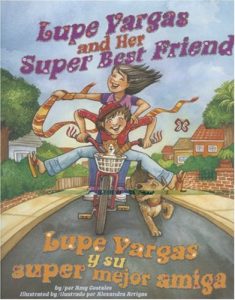 Lupe and Maritza are super best friends. When they’re together, they can be anything they want—pirates, scientists, or heroes. When they’re apart, well, life just isn’t as fun. This is the story of two girls who make each day a new adventure. And when they get into a spat—which is inevitable even among the most super, best of friends—they have to find a way to make it right. And luckily, with a little bit of this and a little bit of that, they do.
Lupe and Maritza are super best friends. When they’re together, they can be anything they want—pirates, scientists, or heroes. When they’re apart, well, life just isn’t as fun. This is the story of two girls who make each day a new adventure. And when they get into a spat—which is inevitable even among the most super, best of friends—they have to find a way to make it right. And luckily, with a little bit of this and a little bit of that, they do.
United States
Materials from United States of America
Voices In First Person: Reflections On Latino Identity
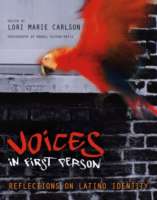
This eclectic, gritty, and groundbreaking collection of short monologues features 21 of the most respected Latino authors writing today, including Sandra Cisneros, Oscar Hijuelos, Esmeralda Santiago, and Gary Soto. Their fictional narratives give voice to what it’s like to be a Latinx teen in America. These voices are yearning. These voices are angry. These voices are, above all else, hopeful. These voices are America.
Young Zorro: The Iron Brand (Young Zorro)
 Diego de la Vega is more concerned with riding horses and making mischief with his best friend, Bernardo, than about fighting injustice. But all that changes when men start disappearing from the pueblo of Los Angeles and cattle go missing from his father’s rancho. Diego and Bernardo are about to encounter an injustice so evil that they will have no choice but to take action. Inspired by Isabel Allende’s novel Zorro, which reveals how Diego de la Vega became the legendary masked hero, Young Zorro: The Iron Brand introduces readers to a land of vaqueros and kidnappers—an exciting world in which a young hero is formed.
Diego de la Vega is more concerned with riding horses and making mischief with his best friend, Bernardo, than about fighting injustice. But all that changes when men start disappearing from the pueblo of Los Angeles and cattle go missing from his father’s rancho. Diego and Bernardo are about to encounter an injustice so evil that they will have no choice but to take action. Inspired by Isabel Allende’s novel Zorro, which reveals how Diego de la Vega became the legendary masked hero, Young Zorro: The Iron Brand introduces readers to a land of vaqueros and kidnappers—an exciting world in which a young hero is formed.
The Eyes Of The Weaver: Los Ojos Del Tejedor
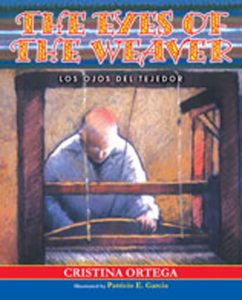 Cristina Ortega is the granddaughter of Juan Melquiades Ortega, a master weaver of northern New Mexico’s Chimayó Valley. Chimayó’s roots are in early Spanish Colonial times and has long been famous for its unique weavings. Juan M. Ortega was taught to weave by his father in the early days when weavers sheared their own sheep and spun and dyed the wool for their blankets. El Tejedor (The Weaver) continued weaving until he was one hundred years old, when his eyesight failed him. In The Eyes of the Weaver, Cristina shares her memories of visits when she was ten years old with Grandpa in the village of Chimayó, where he taught her how to weave. She also recalls how Grandma helped her husband choose color combinations for his Chimayó blankets. It was during these visits that Cristina learned how important it is for a child to listen to and learn from his or her relatives.Some of Juan M. Ortega’s weavings and tools of the trade have been included in the exhibit, “American Encounters,” at the National Museum of American History, Smithsonian Institution, in Washington, D.C.Reading level: 10 years and up
Cristina Ortega is the granddaughter of Juan Melquiades Ortega, a master weaver of northern New Mexico’s Chimayó Valley. Chimayó’s roots are in early Spanish Colonial times and has long been famous for its unique weavings. Juan M. Ortega was taught to weave by his father in the early days when weavers sheared their own sheep and spun and dyed the wool for their blankets. El Tejedor (The Weaver) continued weaving until he was one hundred years old, when his eyesight failed him. In The Eyes of the Weaver, Cristina shares her memories of visits when she was ten years old with Grandpa in the village of Chimayó, where he taught her how to weave. She also recalls how Grandma helped her husband choose color combinations for his Chimayó blankets. It was during these visits that Cristina learned how important it is for a child to listen to and learn from his or her relatives.Some of Juan M. Ortega’s weavings and tools of the trade have been included in the exhibit, “American Encounters,” at the National Museum of American History, Smithsonian Institution, in Washington, D.C.Reading level: 10 years and up
Off and Running
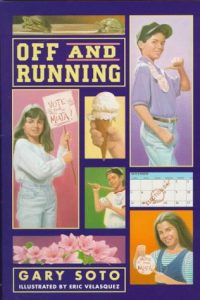 The biggest race of the school year is on! Fifth-grader Miata Ramirez is running for class president. Her best friend, Ana, is her running mate. The girls are stunned when they learn they are running against class clown Rudy Herrera and his friend Alex. At first Miata is certain she will win the election. She has big plans to make the school a better place. She’ll clean up the graffiti, plant flowers and trees, and get computers. Rudy’s confident he’ll get votes by promising longer recess periods and selling the students ice cream every day. Miata is serious and means business. But the boys are funnier and louder. The girls think if they quickly change their image, they’ll get those extra votes. But the election is just a few days away. Readers will catch election fever as the boys square off against the girls in Gary Soto’s latest novel featuring Miata Ramirez from The Skirt and Rudy Herrera from The Pool Party.
The biggest race of the school year is on! Fifth-grader Miata Ramirez is running for class president. Her best friend, Ana, is her running mate. The girls are stunned when they learn they are running against class clown Rudy Herrera and his friend Alex. At first Miata is certain she will win the election. She has big plans to make the school a better place. She’ll clean up the graffiti, plant flowers and trees, and get computers. Rudy’s confident he’ll get votes by promising longer recess periods and selling the students ice cream every day. Miata is serious and means business. But the boys are funnier and louder. The girls think if they quickly change their image, they’ll get those extra votes. But the election is just a few days away. Readers will catch election fever as the boys square off against the girls in Gary Soto’s latest novel featuring Miata Ramirez from The Skirt and Rudy Herrera from The Pool Party.
The Secret Story Of Sonia Rodriguez
 Sonia Rodriguez was born in the United States, but her parents are Mexican immigrants who came to California before she was born. Her father has three Social Security numbers, her mother is pregnant (again), and neither of them speaks English. Sonia’s mother spends most of her time in bed, watching soap operas, and letting Sonia clean up after her brothers. Sonia’s father works dutifully to support his family, but he knows that his daughter’s dreams are bigger than making tamales for family get-togethers. When Sonia attempts to put school work before her familia, her mother decides that it’s time for Sonia to visit her grandmother in Mexico to learn “the ways of the old world.” While in Mexico, Sonia spends time with her wise grandmother and her cousin Maria who teach her that while familia is important, the most important thing is to follow your heart. Sonia returns to the States determined to succeed in school, but the birth of her new twin siblings, inappropriate advances from her drunk uncle (Drunkle), and a forbidden relationship with an El Salvadorian boy push school to the back burner. If only Sonia can find the time to cook dinner, secretly meet with her boyfriend, avoid her Drunkle, AND finish her homework, she just might be able to graduate from high school…
Sonia Rodriguez was born in the United States, but her parents are Mexican immigrants who came to California before she was born. Her father has three Social Security numbers, her mother is pregnant (again), and neither of them speaks English. Sonia’s mother spends most of her time in bed, watching soap operas, and letting Sonia clean up after her brothers. Sonia’s father works dutifully to support his family, but he knows that his daughter’s dreams are bigger than making tamales for family get-togethers. When Sonia attempts to put school work before her familia, her mother decides that it’s time for Sonia to visit her grandmother in Mexico to learn “the ways of the old world.” While in Mexico, Sonia spends time with her wise grandmother and her cousin Maria who teach her that while familia is important, the most important thing is to follow your heart. Sonia returns to the States determined to succeed in school, but the birth of her new twin siblings, inappropriate advances from her drunk uncle (Drunkle), and a forbidden relationship with an El Salvadorian boy push school to the back burner. If only Sonia can find the time to cook dinner, secretly meet with her boyfriend, avoid her Drunkle, AND finish her homework, she just might be able to graduate from high school…
Tyrone’s Betrayal (Roosevelt High School)
 Drinking and fighting are nothing new in Tyrone’s house, but this time, his dad leaves and doesn’t come back. Tyrone’s anger at his father’s desertion finds an outlet through violent eruptions at school. Life at home is no better as his mother begins working a night job to pay the bills and expects him to take care of his siblings. Instead, he starts partying with older kids, skipping school, and sneaking home in the early morning hours. But when his younger brother is caught stealing candy, Tyrone realizes that he will have to take on the responsibility whether he wants to or not. Settling in to his new role, Tyrone is furious when he learns that his father wants to come home. He just doesn’t understand how his mother can forgive his father so easily. With the help of his friends and counselor, Tyrone begins to deal with his feelings of anger and betrayal as the son of an alcoholic, absentee father. This book is the seventh novel in Gloria Velasquez’s popular Roosevelt High School series, which features a multiracial group of teenaged students who must individually confront social and cultural issues (such as violence, sexuality, and prejudice) that young adults face today.
Drinking and fighting are nothing new in Tyrone’s house, but this time, his dad leaves and doesn’t come back. Tyrone’s anger at his father’s desertion finds an outlet through violent eruptions at school. Life at home is no better as his mother begins working a night job to pay the bills and expects him to take care of his siblings. Instead, he starts partying with older kids, skipping school, and sneaking home in the early morning hours. But when his younger brother is caught stealing candy, Tyrone realizes that he will have to take on the responsibility whether he wants to or not. Settling in to his new role, Tyrone is furious when he learns that his father wants to come home. He just doesn’t understand how his mother can forgive his father so easily. With the help of his friends and counselor, Tyrone begins to deal with his feelings of anger and betrayal as the son of an alcoholic, absentee father. This book is the seventh novel in Gloria Velasquez’s popular Roosevelt High School series, which features a multiracial group of teenaged students who must individually confront social and cultural issues (such as violence, sexuality, and prejudice) that young adults face today.
Someone Like Summer

Annabel first sees him playing soccer near her house. His name is Esteban—she sees it on the back of his team shirt. He notices her, smiles, then looks back over his shoulder at her again.
It is the beginning of summer in the resort town of Seaview. It is also the start of a romance between a young Colombian who came to town to work and the daughter of a local contractor whose crews are entirely Latino—new immigrants who are changing the face of Seaview.
This is the summer of war in Iraq, and of Hurricane Katrina. But in Seaview there are other concerns. In Annabel’s house her new boyfriend is at the top of the list. And Esteban’s sister has harsh words for his choice of a girlfriend.
M. E. Kerr weaves a compelling story of star-crossed love and a small-town problem of nationwide significance.
The Corn Woman: Stories And Legends Of The Hispanic Southwest
The culture, history, and spirit of the Hispanic Southwest are celebrated through 45 fascinating stories and legends from the region. From ancient creation myths of the Aztecs and traditional tales of Spanish colonialists to an eclectic sampling of the work of modern Latino storytellers, this book provides a rich tapestry of both obscure and well-loved stories-religious stories; animal tales; stories of magic, transformation, and wisdom; and chistes (short comic tales). Fifteen tales are also presented in Spanish.
Little Night
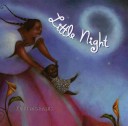
As the long day comes to an end, Mother Sky fills a tub with falling stars and calls, “Bath time for Little Night!” Little Night answers from afar, “Can’t come. I am hiding and you have to find me, Mama. Find me now!” Where could Little Night be? Down a rabbit hole? In a blueberry field? Among the stripes of bees? Exquisitely painted and as gentle as Little Night’s dress crocheted from clouds, this is a story to treasure.
